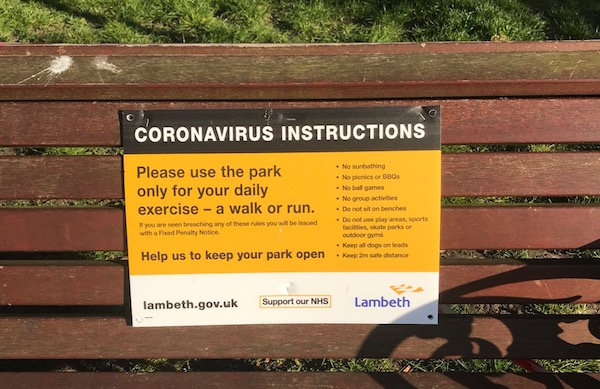Post
#WhenThisIsAllOver | Covid-19 and London's Outside Space
21 Apr 2020
As part of our collection of opinion pieces on the pandemic and the lockdown - #WhenThisIsAllOver - Freddy Mardlin looks at public space in London (another theme for the Society this year) and how Londoners all need more access to this vital resource.
London, unlike many of Europe’s cities, is blessed by a preponderance of green space and what the lockdown has brought to light is the dependence of many of London’s inhabitants on these public parks and spaces. The Mayor’s Housing Strategy finds that more than half of London’s dwellings are flats (which are less likely to have gardens,) and the average size of gardens for those that do have them is 40% below the national average. This crisis really highlights how, despite London not being as densely populated as many of its European counterparts, a very large number of its residents, especially in the inner boroughs, do not have private outside space and are reliant upon public spaces.
And this open space is not evenly split around the city; London’s wealthiest 10% of wards have almost 60% of their land taken up by private gardens and parkland (with roughly equal proportions of each) while the poorest have only around 25% as parkland and another 20% as private gardens. Social distancing in these wealthier wards should therefore be significantly more achievable, with far less strain being placed on the available parkland. Such strains have led to some parks, such as Victoria Park (Tower Hamlets) and Brockwell Park (Lambeth) suffering temporary closure due to what has been seen as ‘inappropriate use’ of the park space during the crisis. Closing parks in this way is not, however, the most appropriate response as such actions have a disproportionate effect on those who are the most dependent on these spaces - the poorest of London’s residents. This group is already two to three times more likely to develop mental health issues that the wealthiest Londoners and stripping away access to public spaces and exercise is likely to dramatically worsen this situation. There is, moreover, no evidence to suggest that these actions are effective. The closing of areas like Brockwell Park and Mount Pleasant Cemetery has been directly attributed to crowding in other areas, suggesting that councils had managed merely to shift the issue to other areas rather than providing a solution.
This issue then begs the question of what can be done to rectify the situation. Parks can hardly be subdivided into private gardens, nor with the ongoing housing crisis would much governmental support be found for building homes with large gardens, since the focus is on affordability and quantity. If urban planners and government agencies fail to see the need for private outside space then the next time an event such as the Covid-19 pandemic occurs, the city will be faced with the same public and mental health disaster that is currently afflicting it. Open balconies, such as those in the housing projects of Camden, rooftop gardens or communal gardens, shared between a small number of flats rather than the masses of the general public, all could provide safe and relatively cheap solutions. The implementation of such spaces into more of the city’s urban development projects would simultaneously reduce the stress on public parks and increase the wellbeing of London’s residents, especially the poorest, who currently are the least likely to have private outside space.
Gardens have not only been shown to improve mental health but also reduce crime rates and improve air quality by filtering out toxins. The arguments for urban rejuvenation projects centred around building affordable, yet high quality housing with outside space are many and with the attentions of the world drawn to the topic by the Covid-19 virus, the time feels ripe for this kind of project.
WhenThisIsAllOver is the London Society's debate about what the post-virus, post-lockdown world will and should look like. Contributions so far include:
- Chris Williamson | Weston Williamson + Partners | Change is needed
- Clare Richards | ft'work | Local is central
- James Raynor | Grosvenor Britain and Ireland | We need system change
- Freddy Mardlin | London’s Outside Space
- Andrew Beharrell | Pollard Thomas Edwards | Reevaluation
- Amy Warner | Appreciate More
- Mike Stiff | Stiff + Trevillion
- Lord Toby Harris | London will need fresh purpose
- Matt Brown | How should we commemorate the heroes?
- Peter Murray in conversation with Robert Elms
- Prof. Samer Bagaeen | Create a resilient economy
- Neil Bennett | Farrells | High Streets must Act or Die
- Buckley Gray Yeoman | How can design respond?
- Alistair Barr | Bring production back to the West End
- David Morley | There's only one Way
- Chris Williamson | Getting back to work
- Nicholas Falk | URBED | The suburban battle grounds
- Roland Karthaus | Matter Architecture | Institutional architecture in a time of crisis
- Jonathan Manns | Rockwell Property | Planning for #WhenThisIsAllOver
- Daniel Moylan | We need to stop telling people what to do
- Dr Meredith Whitten | We need a green infrastructure
Please give your views in the comments below, or by emailing blog@londonsociety.org.uk
